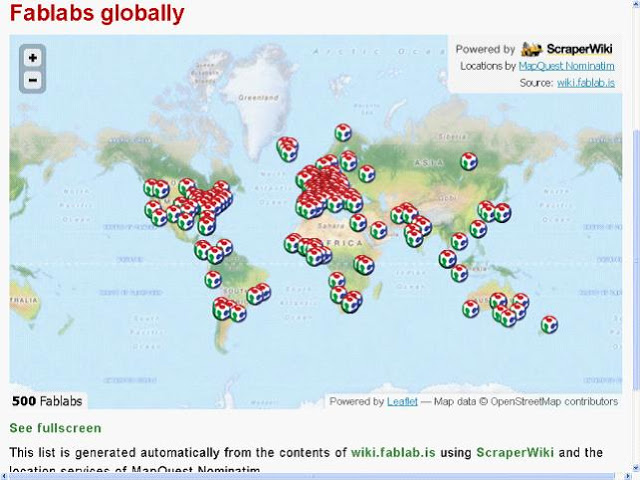I met the team behind MAKLAB, the digital fabrication studio based in Glasgow, Scotland, at the first Scottish MakerFaire, in Edinburgh, at the Scottish Science Festival earlier this year. They have recently launched a crowdfunding campaign on Kickstarter to raise funds to extend their operation to London, with the aim of initiating a UK Network.
MAKLAB has the support of Makerversity.org, and is look to set up in the central London setting of Somerset House to create a makerspace. The aim is to nurture young start-up businesses, be more accessible to the wider public and help ignite the spirit of a new industrial revolution — something that I am very keen on myself — a revolution is definitely needed in our approach to industry, both economically and ecologically.
These guys are very competitive, the team members present in Edinburgh were challenging in person, but, as at the time I was considering doing that which they have, that’s the nature of business. I did wonder a little at their statement of being not-for-profit, thus I mailed MAKLAB expressing that I felt that some of the prices were perhaps a little steep, and was told that they are merely reflecting their outgoings. Readers of my articles will know that I’m far from afraid to speak my mind, so, rest assured that I have thought about it, and their venue would indeed likely necessitate these prices. However: they certainly do offer extremely useful resources for start-up businesses. These include, with prices:
- CNC Table 1200x2400mm (£60 per hour)
- Laser Cutter 900x1200mm (£40 per hour)
- Plasma Table 1200x1200mm (£60 per hour)
- CNC Mill 200x200x120mm (£20 per hour)
- Micro CNC Mills ((£10 per Half Day)
- 3D Printers (£5 to £50+ depending on model)
- 3D Scanners (£20 per Half Day)
- Vinyl Cutter 600mm (£10 per Half Day)
- Heat Press (£10 per Half Day)
Fab labs (fabrication laboratories) are small-scale workshops offering access to a varied selection of digital fabrication tools, with the aim of stimulating innovation. While these spaces have yet to incorporate with Fordist mass production, they have wide support, and many bear witness to their future potential.

Insert Image: FABLAB map.jpg with caption A global map of FabLabs can be found here:http://fablabamersfoort.nl/nl/fablabs-globally
The sharing of manufacturing information in the UK can be traced back to the 18th century when from 1781 to 1852 Cornish mining industrialists and engineers took out just 1.5% of all the patents on steam engines in England for that period. Yet it was Cornwall that also contributed the most to the innovation and development of steam technology during that same period.
This was facilitated by the publication of a monthly journal reporting the relevant technical characteristics and the performance of each engine. The publication (later called Lean’s Engine Reporter after Joe Lean the first editor) explicitly fermented the rapid dissemination and diffusion of best-practice techniques, it also nurtured high levels of competition amongst the engineers involved, which in turn accelerated the rate of technical progress. Throughout this period, the development of the Cornish engine remained in a fluid state and this facilitated a more thorough exploration of alternative designs

Aggressive patenting eventually curtailed this practice. But since the recognition and embracing of disruptive approaches by leading manufacturers, such as open innovation, the traditional intellectual-property approach is facing a challenge. In a world where open innovation is embraced and knowledge is distributed widely, companies cannot afford to rely entirely on their own research, but can instead procure knowledge, processes or inventions from the network. Concepts of user innovation, cumulative innovation, mass innovation and distributed innovation flourish in these maker spaces.

Also forthcoming in London, the world’s largest 3D printing store iMakr, which currently has a temporary satellite pop-up store in the world famous Selfridges as covered by myself at 3DPI here, will be showcasing 3D Printing and 3D Scanning at the 100% Design Show, 18-21 September 2013, Earls Court London, with a 100 square meter apartment in the centre of the shows Interior Design Space.


